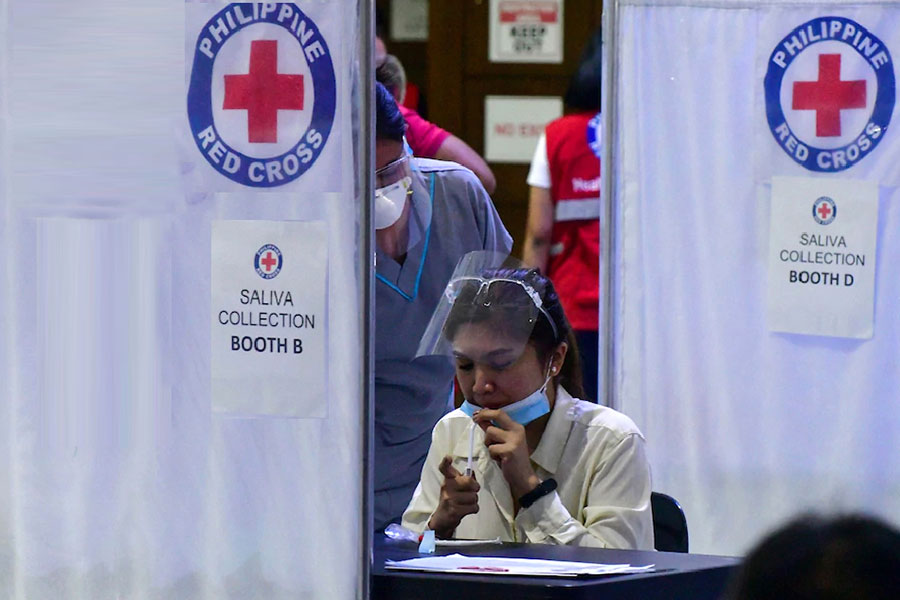
By Joseph B.A. Marzan
The chief of the Philippine Red Cross’ (PRC) molecular laboratory announced on Friday that saliva tests for the coronavirus disease 2019 (COVID-19) could begin in Iloilo within this week.
The concept of testing for COVID-19 via a person’s saliva was developed at the University of Illinois at Urbana-Champaign by a team of nine scientists led by Filipina scientist Dr. Diana Rose Ranoa of the university’s Department of Chemistry and Institute for Genomic Biology.
This involved extraction of saliva from a patient into a vial via simple methods such as spitting or drooling, and has been proven to detect COVID-19 at an accuracy rate of up to 99 percent.
The technique uses the same machines and reagents as the Reverse Transcription-Polymerase Chain Reaction (RT-PCR) method, which is the current method used worldwide and in the Philippines.
In the Philippines, the use of the saliva tests was first suggested by the PRC, and they started testing its effectivity in September with 238 sample participants.
Former health secretary Dr. Paulyn Ubial, who is also chief of the Red Cross Molecular Laboratories, told Daily Guardian on Air that the Department of Health (DOH) gave them authorization on January 4 to conduct more tests using 1,000 samples, with validation via swab test for every 100 samples.
The PRC charges P2,000 per saliva test in their laboratories, compared to the RT-PCR tests which costs around P3,000 to P4,000 in other private laboratories.
She said, however, that test costs for saliva testing may even be lowered if there are more people undergoing these tests, citing “economies of scale”.
Through statistical analysis of 1,000 samples and 106 validation swab tests, Ubial said the PRC got a 98 percent accuracy rate.
Saliva tests are viable for up to seven days but has a faster lead time, with processing lasting only for up to four hours according to a CNN Philippines report.
Ubial said that the PRC will be dispatching machines and supplies to its molecular laboratories in Bacolod City and Passi City.
The Bacolod City laboratory has been operating since being accredited by the DOH last year, while the Passi City laboratory opened only this January.
Ubial pointed to this week as the kick-off for the saliva-based testing in Passi City, probably on February 2 or 3, 2021.
Ubial called the saliva-testing a “game-changer” because of its economic costs, due to the lack of needed personnel, and lead time for testing, compared to the RT-PCR method.
“This is very good for the economy because it is a game-changer. With the saliva test, there would be no need for trained health professionals to get the samples, this could be done with self-collection. We can test a lot, and we can test simultaneously. What had happened before, even for us in the Red Cross office, they would test 20 today, 20 tomorrow, 20 next week, and tests would wait up to a month, and someone would test positive or isolate [for a long time]. But now, with the saliva, we can test everybody all at the same time. 100 people, 200 people, no problem. It would be easier for us to isolate the positive, and control disease transmission, with this new method of testing,” said Ubial.
The only bane Ubial pointed out was that the saliva specimen needed to be tested out in batches with minimum of 65 and maximum of 90 and cannot lack or exceed the numbers.
“[O]ne batch in a laboratory is at 90 samples. So, for example, if the Iloilo Chapter collects only 20 samples, it cannot be run by the lab immediately and would have to wait for more samples, because it would be a waste for the lab. They would still have to wait for up to 45 more [samples], because that is our minimum, and then it can run. Results will be released slower when there are less people on testing, but when there are more people, we can commit to release results in less than 12 hours,” she said.
VACCINES
Ubial also briefly discussed about COVID-19 vaccines, and the PRC’s efforts to aid the national government in its immunization programs.
It was in Ubial’s tenure as DOH secretary that the scandal involving the dengue vaccine Dengvaxia, developed by French company Sanofi, broke out in the news.
The vaccine was bought in 2015 by her predecessor during the Aquino administration, and was allegedly responsible for 600 deaths, although there are reports that there is no direct link between deaths and Dengvaxia.
The Dengvaxia issue has been blamed for lower numbers in vaccination in the country, and is said to also be the cause of a slight but significant rise in some disease which have been low in past decades, such as measles and polio.
Ubial said the PRC had also been helping the national government distribute and administer vaccines for measles, rubella, and polio,
She added that the PRC would also be continuing its assistance this February, as the DOH will aggressively campaigns for its Measles, Rubella, and Oral Polio Vaccine Supplemental Immunization Activity (MR OPV-SIA).
The PRC’s assignments, according to Ubial, include far-flung areas not normally reachable by traditional and brick-and-mortar health facilities, as well as conflict zones such as the Bangsamoro Autonomous Region in Muslim Mindanao (BARMM).
Ubial said that there was still some “vaccine hesitancy” in the country caused by the Dengvaxia hullabaloo.
“We still have recorded some numbers of vaccine hesitancy. We can understand the people who have fear of vaccination. The history of Dengvaxia is that, the introduction was rushed, so it can catch up with the [2016] election. I said at the time that it was a really bad public health program to introduce new programs during an election year, because even if the vaccine is good, it will be tainted,” recalled Ubial.
She assured the public that the COVID-19 vaccines were a different case, owing to the “careful and strict” practices by the Food and Drug Administration (FDA) in monitoring and evaluating these vaccines, saying that people “should trust the FDA”.
This January, the FDA gave Emergency Use Authorizations (EUA) to two manufacturers of COVID-19 vaccines – BNT162b2 by American drugmaker Pfizer and German biotechnology company BioNTech on Jan. 14, and AZD1222 by British-Swedish pharmaceutical company AstraZeneca last Jan. 28.
Many leaders in the country, including Iloilo City Mayor Jerry Treñas and Iloilo Governor Arthur Defensor Jr., have placed orders for the AstraZeneca vaccine.
According to Ubial, the Pfizer-BioNTech vaccines will only be available in the country by 2022, while the AstraZeneca vaccines will be delivered by either March or April of this year.
“[W]e want to assure people that Dengvaxia is different from the COVID vaccines. Right now, our COVID vaccine was studied and the introduction was done carefully and scientifically. We are not introducing vaccines without FDA approval. In fact, when there is news of [a vaccine] entering our country, that would be investigated. We assure our public that at this time, in the distribution of COVID-19 vaccines, we are being careful in following the scientific process and the regulatory processes of the [FDA],” she said.
With regard to vaccine preferences, Ubial echoed previous statements by current DOH Secretary Francisco Duque III and Presidential Spokesperson Herminio Roque Jr., to “not be choosy” when it comes to the COVID-19 vaccines.
Her reasoning was different, however, from Duque’s and Roque’s, as she explained that the public needed to get vaccinated as soon as possible, in two doses, to “reach herd immunity”, and to not wait for other vaccines to arrive in the country.
For herd immunity to be attained, public health experts state that 70 percent of a population in an area must undergo immunization.
“If I say, [Pfizer-BioNTech], which everyone says is very high in efficacy, but what if we can’t get Pfizer, would we have to wait and not get ourselves vaccinated immediately? But the bottomline in the vaccination is you get it as soon as possible, as many as possible, to complete the two doses, so we can reach herd immunity. If you have to wait for another vaccine even if there is already one that got here, and you choose not to get that vaccine, you might already catch COVID without a vaccine, so whatever is available, we have to use that,” she said.
As to the national government’s lean towards the CoronaVac made by Chinese company Sinovac, she said that this was based on the availability for the government to procure, adding that 30 million doses were set aside by the company for the Philippine government.
She added that the Sinovac vaccine’s 50 percent efficacy rate, as reported from clinical trials in Brazil, was “better than nothing at all”, citing the World Health Organization’s “acceptable efficacy rate” of 50 percent.
“Actually, that is not what we call ‘preferred’. It was the one available for our government to procure. In our scientific community, 50 percent is better than nothing at all. The WHO accepts that at 50 percent,”




















